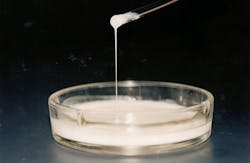A new natural dairy thickener may add probiotic characteristics to foods. It was discovered by microbiologists at Oregon State University, who also helped patent and commercialize the product.
The new type of thickener is produced by a natural bacterium that was isolated in Oregon. Research at the university in the early 1990s identified a novel polymer with an ability to rapidly thicken milk. Known as Ropy 352, this polymer is produced by a non-disease-causing bacterium.
"This is one of many naturally occurring, non-disease-causing bacterial strains my research program isolated and studied for years," commented Janine Trempy, an OSU microbiologist. "We discovered that this bacterium had a brand-new, never-before reported grouping of genes that code for a unique polymer that naturally thickens milk. In basic research, we've also broadened our understanding of how and why non-disease-causing bacteria produce polymers."
Studies indicate that the polymer gives fermented foods a smooth, thick, creamy property. It may initially find uses in sour cream, yogurt, kefir, buttermilk, cream cheese and artisan soft cheeses, the university said.
Additionally, it offers a slightly sweet property and may improve the sensory characteristics of low-fat or no-fat foods. Unlike other polymers that are commonly used as thickeners, it may also add probiotic characteristics to foods, with associated health benefits.
The product could potentially have a significant impact in the food processing industry, and it may have further applications such as thickening of pharmaceuticals, nutraceuticals, cosmetics and personal care products.
According to Oregon State University, the global market for polymers such as this is almost $7 billion. Consumers in the United States spend an estimated $120 billion a year on probiotic products such as yogurt, sour cream and buttermilk.
The university recently agreed a non-exclusive license for its patented Ropy 352 technology to a leading global company in the field of dairy starter cultures.
